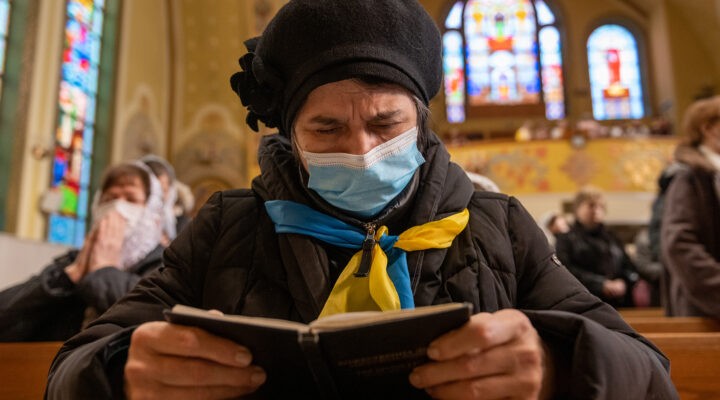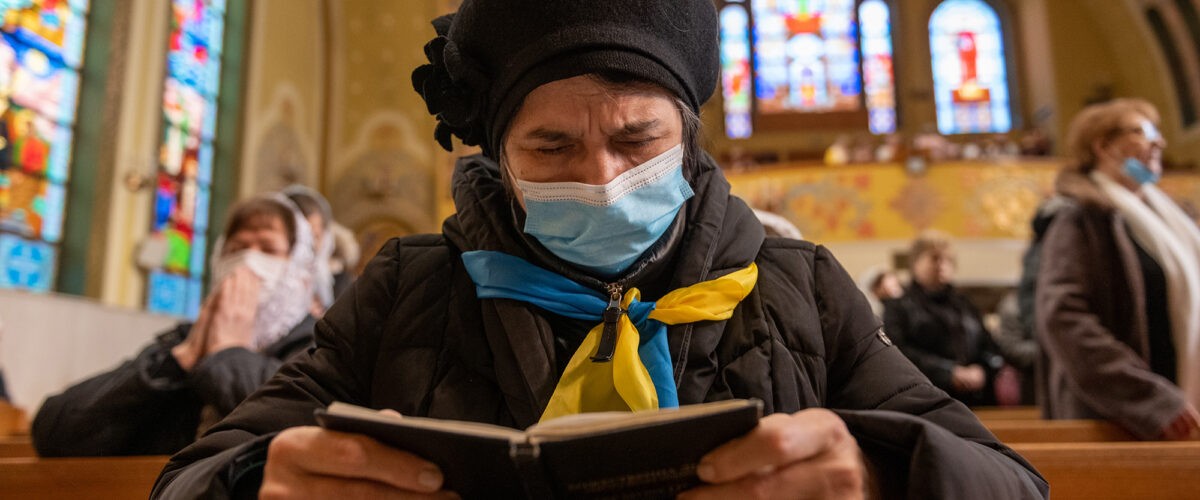Religious liberty in Ukraine is doomed if Russian invaders defeat the Eastern European nation that has become a bastion of church-state separation among former Soviet republics.
That was the informed opinion expressed by two international religious freedom experts during a March 3 webinar hosted by Baptist News Global.
This should come as no surprise because Russia is a notorious persecutor of religious groups other than its own Russian Orthodox Church, said panelist Knox Thames, who served as an adviser on religious minorities for the U.S. State Department during the Obama and Trump administrations.
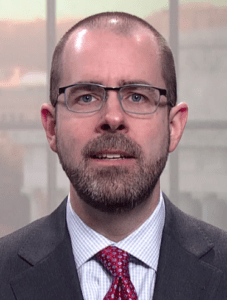
Knox Thames
“The invasion is going to be bad news for a lot of Ukrainian believers” if Russian President Vladimir Putin conquers his western neighbor, Thames said.
Protestants will be among the most imperiled by a Russian victory, said panelist Wade Kusack, founder and president of the Love Your Neighbor Community, a nonprofit that seeks to foster religious freedom in Eastern Europe and Central Asia.
“If the Russian invasion succeeds, it will be a disaster for all religious communities except one or two. Only one church will be allowed. It will be a huge disaster for all evangelicals in Ukraine,” said Kusack who, along with Thames, also is a senior fellow of the Institute for Global Engagement.
A complex religious and political history
In the hour-long conversation moderated by BNG Executive Director Mark Wingfield, Kusack and Thames illuminated how the complex religious, political and military history shared by Russia and Ukraine contributed to the ongoing war and how the conflict fits into the rising global tension between authoritarianism and religious freedom.
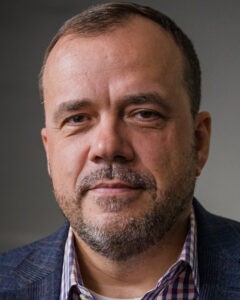
Wade Kusack
The Russian threat to religious minorities was on full display during Russia’s 2014 invasion and annexation of Ukraine’s Crimean Peninsula, Kusack said. During that attack and occupation “we witnessed the persecution of evangelical Christians and other minority religious groups.”
The current danger to non-Orthodox Christians and members of other faiths also can be inferred from Russia’s treatment of faith communities within its own borders, Thames said.
The persecution was so severe in recent years that the Trump administration placed Russia on the U.S. State Department’s special watch list. That designation was accelerated even further by the Biden administration, making Russia a Country of Particular Concern for violations of religious freedom.
“That is a mode of repression Russia has perfected, and we can see it spreading throughout Central Asia,” Thames said.
Ukraine as a success story on religious freedom
The possible extinction of Ukrainian religious liberty would be especially tragic given the flourishing of multiplicity of faith groups that have taken root in the country since it left the Soviet Union in 1991, Kusack said. “Ukraine is a success story in terms of religious freedom, and it is one of the most successful former Soviet republics in this manner.”
The nation is an anomaly among Eastern European countries, which typically feature one national, Orthodox church, and are hostile to all other comers, Thames added. “Ukraine’s uniqueness is that it has multiple expressions of Christianity living side by side,” including an Orthodox jurisdiction aligned with Moscow, another with the Ecumenical Patriarch in Istanbul, and a group that is Orthodox in worship but loyal to the pope in Rome.
“Ukraine’s uniqueness is that it has multiple expressions of Christianity living side by side.”
In addition, there are thriving Jewish, Muslim and Protestant communities in Ukraine. “The state is neutral in its treatment of them all. … State neutrality toward religion has allowed lots of flowers to bloom” which makes the country “a remarkable success story” for religious freedom, Thames said.
A variety of Protestant movements, including Baptists, evangelicals and Pentecostals, are among the groups that have flourished in Ukraine’s church-state separation environment, Kusack added. “It’s very much developed. Much more than any of the other former Soviet republics. They have a large number of church members in all the denominations.”
But it is more than diversity that defines the flourishing of faith in Ukraine, he added. “In the invasion of 2014, we saw in eastern Ukraine … Christians and Muslims praying together. This is more than tolerance. This is cooperation.”
Putin and the Russian Orthodox Church
On the other hand, the cooperation of Putin and the Russian Orthodox Church also has come into view since the invasion of Ukraine on Feb. 24.
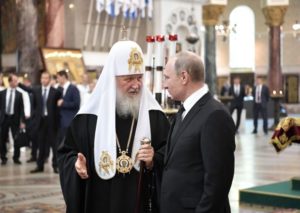
Vladimir Putin with Russian Orthodox Patriarch Kirill in 2019.
Kusack said the relationship between church and state in Russia is hard to describe but seems to include Putin’s use of the faith to blend his version of Slavic nationalism with his personal interpretation of Orthodoxy — all with cooperation from Russian Orthodox Patriarch Kirill of Moscow.
Putin has helped rebuild the Russian Orthodox Church since coming to power in 2012, but also has used it to “create a new ideology to replace communist ideology … and they are trying to use the Orthodox Church to manipulate people,” Kusack said.
While Kirill has wholeheartedly defended Putin’s Ukrainian invasion, there are signs that some in the Orthodox Church are not on board, Thames said.
He noted that close to 200 Russian priests recently sent a letter to the patriarch demanding “he take a different view on the conflict” because there is “an eternal question at stake here and you have gotten it wrong.”
The dangers of a state church
This points to the severity of the threat inherent in most nations where there is a state church, Thames said.
And for Americans, there is a reminder of this danger in the 1801 letter from the Danbury Baptist Association in Connecticut to newly elected President Thomas Jefferson that pointed out such a danger in the new nation. That letter is regarded by church-state scholars as pivotal in articulation of religious freedoms in America.
What Russia demonstrates is that in places without such religious freedom, asking questions or requesting freedoms can “bring you a world of hurt,” Thames said.
He cited the Church of England, the state church of the United Kingdom, is an exception, where religious freedom is embraced despite the presence of a state church.
In Russia, corruption has infiltrated every level of government and church and the faith has become “pure ideology,” Kusack said.
However, such an exception usually only applies when the church has undergone a process of reformation, which is not the case in Russia, where corruption has infiltrated every level of government and church and the faith has become “pure ideology,” Kusack said. “In that case it is very hard to reform.”
That merged ideology was on display during a recent speech by Putin rationalizing the Ukraine invasion as a response to NATO expansion and as an effort to reclaim Kyiv as a spiritual center for Russia, Thames said. “In his retelling of it, Kyiv is at the center of Russian identity and an expression of Slavic identity. And we see Kirill saying the same thing.”
But the Orthodox churches in Ukraine, including those aligned with Moscow, disputed those claims “and also denounced the invasion,” Thames said.
Is Putin insane?
What the world is trying to figure out, Kusack said, is if Putin’s plan can work or if he is simply mentally ill.
There are signs of the latter, including images of him at the Kremlin seated at tables far from other occupants, Kusack said. “And the things he is saying are absolutely not real. It seems he sincerely believes his own lies.”
Thames asked, “Is he crazy like a fox? Or just crazy?”
Putin often has been described as a master strategist, but only because of successes in much smaller military operations. That reputation is breaking down now given the Russian military’s logistical and combat setbacks in Ukraine, Thames said.
Seeing the global context
In response to a question, the panelists said it’s hard to make direct comparisons between Russia’s treatment of religious minorities and those of other religion-persecuting countries like Myanmar and China.
Thames noted that China has become a sophisticated surveillance state intent on monitoring and controlling the activities of domestic religious groups, while aggressively persecuting those in countries like Tibet with military force and the use of “re-education” camps.
“The fate of Taiwan hangs in how the world responds to Ukraine.”
“What China is doing is just off the charts in the suppression of free religious activity,” he explained. “Russia doesn’t have those resources, but this is where Russians are much more comfortable using indiscriminate violence against everyone.”
A key concern, he added, is that China is likely watching how the West responds to the Ukraine invasion to determine if it will invade Taiwan. “The fate of Taiwan hangs in how the world responds to Ukraine.”
Religious persecution, sustained over long periods of time, has the added effect of making the members of minority faith groups cynical about government and other religions, Kusack said. “Different religious groups still see any government as a threat. It’s really hard to create dialogue between people.”
An opportunity for the church
But congregations and denominations in countries neighboring Ukraine are seeing openings for such dialogue in the approximately 1 million Ukrainian refugees the Russian invasion has created so far, he said.
“This is an opportunity for the church to show what church really is. I see many churches now opening doors. We have partners in eastern Germany, and I don’t remember any churches that would say ‘no.’ They all want to accommodate refugees.”
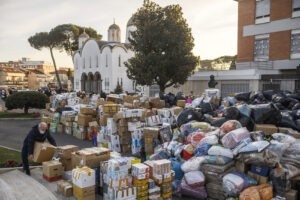
Members of the Ukrainian community living in Rome collect food and medicines to be sent to Ukraine, following Russia’s invasion of Ukraine, at Santa Sofia Church, on March 2, 2022, in Rome. Santa Sofia Catholic Church is dedicated to Holy Wisdom and has connections with Ukraine. It served as the mother church of the Ukrainian Greek Catholic Church while St. George’s Cathedral in Lviv was controlled by the Russian Orthodox Church. Santa Sofia Church in Rome has become the official collection point for basic necessities to be sent to Ukraine. (Photo by Antonio Masiello/Getty Images)
However, the generosity of religious groups and civic organizations can only go so far if the Ukrainian refugee population brings additional stress to an already “broken international immigration system,” Thames added. “If it continues, where are these people going to go? It’s something the world is going to have to grapple with.”
Meanwhile, the infatuation of many conservative Americans with Putin and his Ukraine invasion also has to be contended with. Thames encouraged Americans to examine Russia’s dismal human record and its oppression of faith groups before going all-in on Putin.
“Ukraine didn’t attack anybody” ahead of the invasion during which “Russia bombed the Holocaust Museum (in Kyiv). Just see what’s happening on the ground,” he said.
Also see what the Scriptures say, said Kusack, who cited the encouragement in Hebrews 13 to serve immigrants and others who are suffering.
“God is telling us we are supposed to take their pain personally. There is no ‘them,’” he said, adding that strangers are to be considered as members of the wider church. “If you don’t feel the pain for the church, are you a member of the church?”
Watch the entire webinar here.
Related articles:
Let’s be clear: Putin’s invasion of Ukraine is not about the rapture and Russia in biblical prophecy | Analysis by Rodney Kennedy
Don’t forget the religious implications of geopolitical upheaval | Analysis by Richard Wilson

